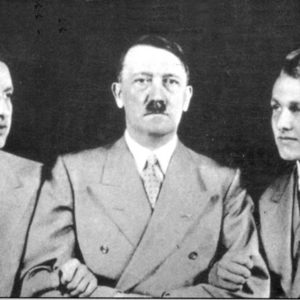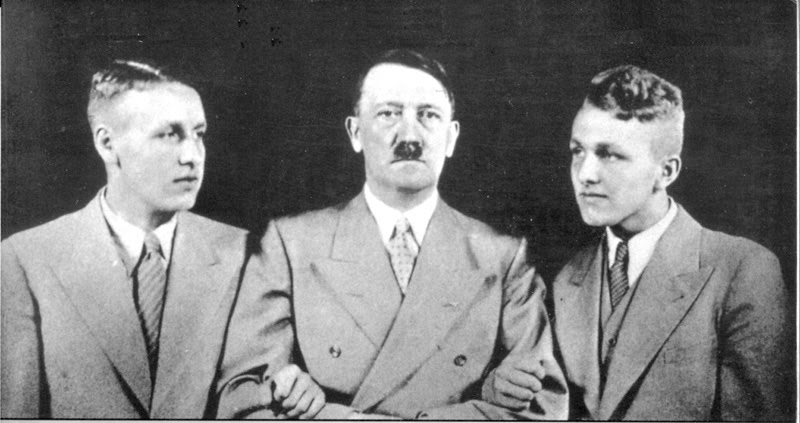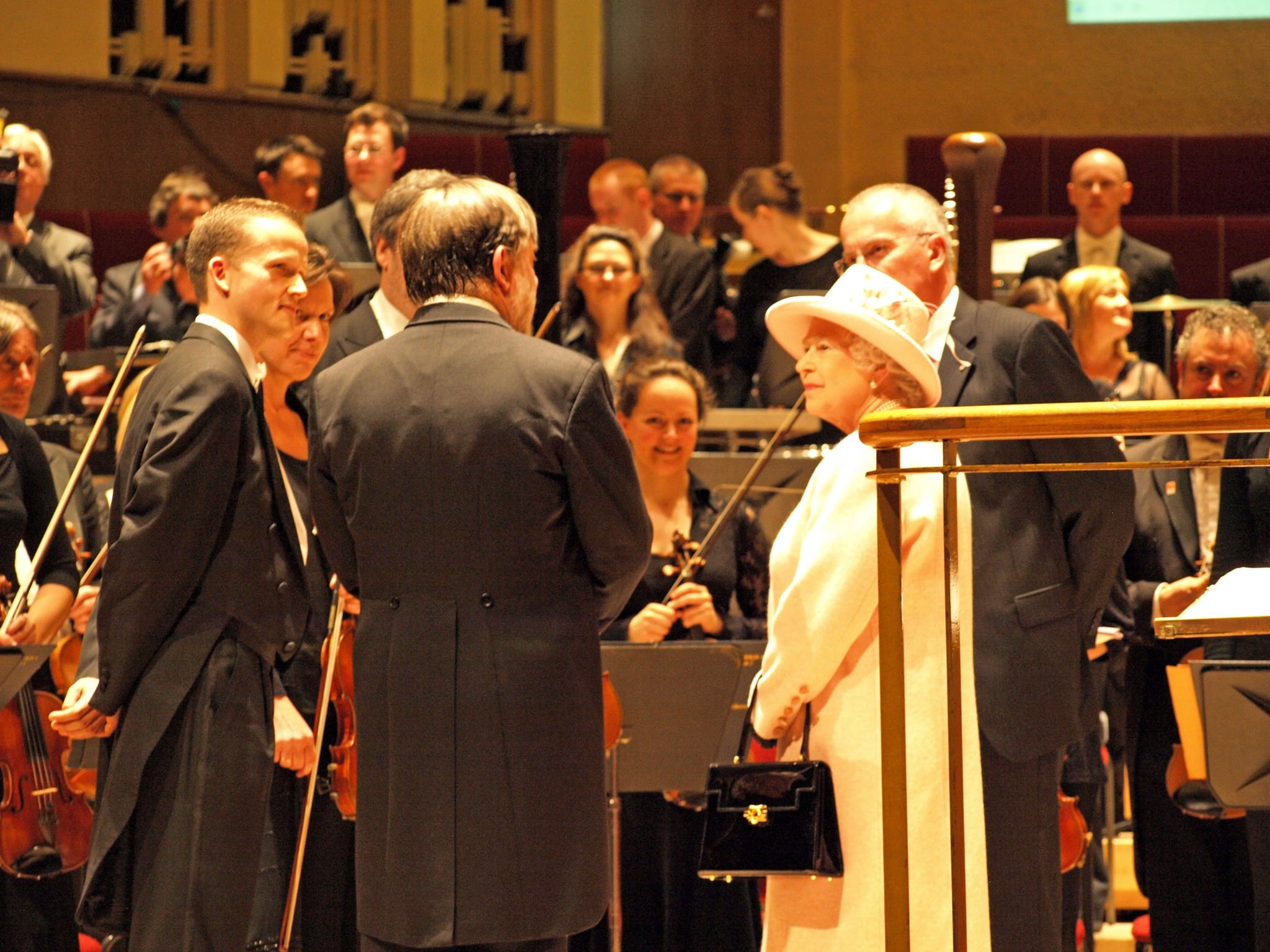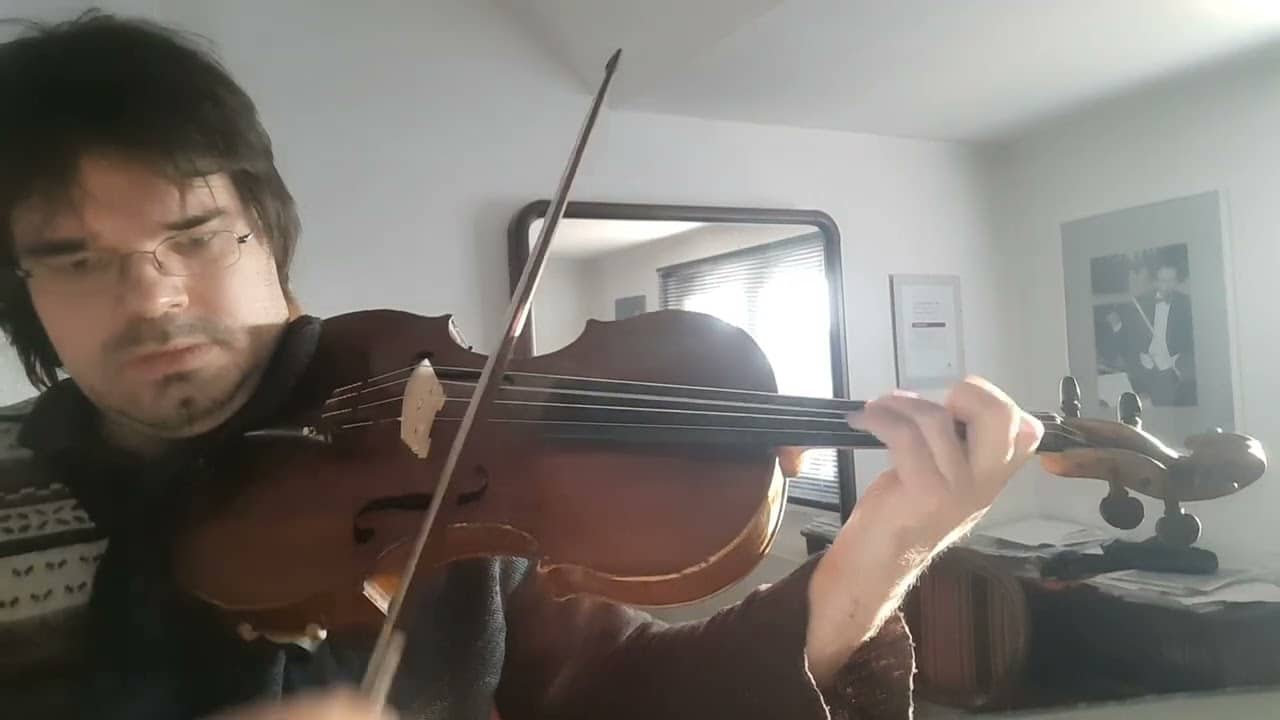Wieland Wagner gets cancelled in German city
NewsThe city council of Stuttgart has renamed a point named after the Bayreuth chief Wieland Wagner, replacing his name with that of the Jewish poet Heinrich Heine. The place was previously named after Heine until 1933, when the Nazis banned him.
Stuttgart’s mayor said the reason for the renaming was Wieland Wagner’s close relationship with ‘Uncle Wolf’ – Adolf Hitler.
We await a reaction from Bayreuth.







The pointless self-flagellation continues…
Heinrich Heine begs to differ.
My ancestry is Jewish. How is it self-flagellation for me to approve of a name change back to a Jewish artist whose name was removed by Nazis?
They are simply restoring the name it previously had prior to the Nazi degeneration. Your own lack of sympathy to their victims is clearly apparent and quite common among you folk.
Taken them long enough!
Maybe Stuttgart Council is currently peopled by an anti-regietheatre complement…
It is restoring the original name.
But to reason that this had to be done because of Wieland Wagner’s ties with Hitler is stretching reality much too far.
WW grew up in a bubble of fake reality, created by the Bayreuth circle and his mother’s attempts to save the festival from the ravages of war, by forging strong ties with Hitler. Being guarded from what was really happening in the world, in his teens Wieland only saw a friendly Wagner enthusiast who happened to be the country’s ‘Führer’, and who protected him and his brother Wolfgang from being recruted into military service. After the war, Wieland underwent a very drastic and painful conversion to reality which was utterly traumatic, resulting in a totally renewed staging style of Wagner’s operas cleansed of teutonism, and focussing on Jungian interiority and archetypes, which was a revelation and which saved the works from total condemnation. He also had a high wall built between the housing of his mother, who never gave-up her loving admiration for the Führer, and Wahnfried, thereby also severing the break with his personal past. Claiming that his tie with Hitler is a reason to remove his name from a street is based upon ignorance.
Anyway Heine is much better, not because he had Jewish ancestry, but because he was one of the greatest poets of Germany and the removal of his name for absurd reasons an abomination.
Thank you John for this comment.
Borstlap’s rationalizations about Nazism are absurd. As if Wieland or any other person could live through events during the Reich like the Kristalnacht or the Nuremburg Laws and have had any illusions about what Nazism was. It is especially appalling to see the distinguished conductor Fabio Luisi endorsing Borstlap’s nonsense (assuming it isn’t a fake use of Luisi’s name.)
We should also note that Wieland’s mother, Winifried, did far more than just patronize Hitler to help Bayreuth, something that was not even necessary since Hitler was an avid Wagnerite. The idea is ridiclous. She exchanged 278 letters with Hitler and was even rumored to have had a romantic relationship with him. The Wagner’s even built an apartment for Hitler on the grounds of Bayreuth to accommodate his regular visits. He was referred to by the Wagner family as “Uncle Wolf.” Just protecting Bayreuth, eh?
The Wagner descendent, Amélie Lafferentz (b. 1944), is in possession of the 278 letters exchanged between Hitler and Winfred. Amélie has never allowed scholars to view these letters, which are very likely of important historical value, especially for Hitler biographers and historians of the Third Reich, to say nothing of the history of Bayreuth. The letters might also document the rumored romantic relationship between Winifried and Hitler. In 1933 there were even rumors of a possible marriage. Winifred’s husband, Siegfried, was secretly bisexual and showed little interest in his marriage with his wife. Why is the Wagner family, or at least Amélie, keeping these letters secret?
Amélie’s father, Bodo Lafferentz, was a high ranking SS officer who married Siegfried and Winifred’s daughter Verena (Amélie’s mother.) Bodo was on the staff of the “Race and Settlement Central Agency” whose mission was to insure the racial purity of the SS. In the town of Bayreuth he founded the “Institute for Physical Research”, an outpost of the Flossenbürg concentration camp, to develop the V-2 rocket. Bodo Lafferentz also organized the Bayreuth “War Festival.” All these connections, and yet Borstlap tells us the Wagner family’s relationship to Hitler and Nazism was just a matter of protecting Bayreuth and Fabio Luisi (or “Fabio Luisi”) cheers him on. It’s a reminder of how much denial and ignorance still exists.
BTW, Amélie lives in Munich, which was the birth city of the Third Reich, and the city Hitler called his “spiritual home.” Those 278 letters that are being held secret are just a small part of Munich’s background world of Nazi history and underground world of Nazi sympathizers that gives the city one of the strangest atmospheres in Europe. Some members of the Wagner family have called for the letters release. This should be done as soon as possible.
Another irony concerning Wieland Wagner is that he is considered to be one of the initiators of Regietheater. After the war, he created minimalist, symbolic, psychological stagings of Wagner as a means of circumventing the unpleasant associations surrounding the composer and 19th century cultural nationalism. His concepts became highly influential in opera and theater in general.
Another irony that Wolfgang Wagner’s son, Gottfried, was the heir apparent for Bayreuth. (Wolfgang was the brother of Wieland.) Gottfried received a Ph.D. in theater studies with a focus on Brecht and Weil, but broke with his family over its Nazi past and became deeply estranged. He has spent most of his life since then living outside of Germany.
This is one of the reasons that Katharina Wagner took over the festival. I’m not so sure about her work as a director, but she has done a remarkable job of addressing the family’s past. Those who know about the worshipful devotion of Wagner in Bavaria, and especially among some of the most powerful politicians, will appreciate the courage she has shown. She has done things that Gottfried was not able to. She deserves our respect.
Wieland Wagner’s production style was not quite Regietheater, but pursued the symbolic approach of earlier pioneers like Michael Praetorius and Alfred Roller who reacted against the fussy 19C naturalism. WW took it several steps further but always created visualisations as much as possible folllowing the nature of the work, concentrating on interiority and psychology. That is why his productions still seem to be the best treatment of these operas.
Regietheater has the stage director imposing his own ideas, different from the work’s, over the opera, resulting in conflicts on a fundamental level and reducing the effect of the music. WW’s productions achieved a unity of sight and sound which enhanced the experience of Gesamtkunstwerk, which was the intention of Wagner himself. Wagner had great difficulty with the naturalism of his own time, found it wanting, but failed to dream-up a better solution. This was the reason that he contemplated to only write purely symphonic music after Parsifal, so that he was no longer hindered by ineffective staging.
A little more background. After the war, during the 1950s, Winifried continued to receive guests notable for their Nazi associations such as Emmy Göring, Ilse Hess, Gerdy Troost (wife of the Nazi architect Paul Ludwig Troost,) the British fascist leader Oswald Mosley, and other prominent Nazi politicians. And yet we’re to condemn as “cancel culture” efforts to rename Stuttgart’s panoramic viewpoint overlooking the city away from close associates with Hitler and return it to the name of Heinrich Heine it once had before the purge.
William, you’ve done well to bring these facts to life. However, you’ve put Winifred on trial here, not Wieland. John’s objection, as I interpret it, isn’t the act of removing Wieland’s name, but the inaccuracy of the reasoning. Wieland would have been 21 in 1938, the year of the anschluss (born 1917). John makes the point that Wieland was raised in an insulated world. Would the 278 letters you refer to overturn that notion? . . . it’s a complex question, because Wieland certainly was exposed to copious amounts of antisemitism in his teens, right? Poland was invaded in ’39, and clearly Wieland would have been aware of that fact. But is he really guilty by association? What could he have done differently at the time? . . . Regardless, John also makes the point that he considers H. Heine to have made the greater contribution to the arts.
We cannot claim that a 21 year-old Wieland didn’t know what was going on. The Nazis made no secret of their ideologies. Everyone knew. We can also be certain his mother spoke to him about Nazi ideals.
This only reinforces the argument that WW lived in a bubble determined by his environment. It takes some time to grow out of such a situation, and WW did so when he grew-up.
We all know that children first simply accept things as they are presented by their parents and surrounding adults, they don’t know better, they don’t have comparisons. It takes an independent character and maturing to break through such barriers.
If you are a child and there appears to be a consensus around you among every adult that you belong to a superior race, that there are awful people out there of a different race who try to undermine a beautiful, pure society, that Poland threatened, under the influence of Jews, to do the same, that in the West there are dangerous, decadent peoples who want to destroy the greatest culture in the world of which you happens to be an important player, how would you know that it is all paranoid nonsense? Only if you can get on the internet, secretly in your sleeping room, you can get some different information.
To William: all of this does not in the least diminish the observation that WW grew-up in a mental bubble. Think of what those children were fed from day one. In those times there was no internet, no TV, no rock and roll, only censured newspapers and censured radio, and parents and adults in the environment had authority. Events like the invasion of Poland happened thus far away from the island of Bayreuth. No need to further elaborate.
And also: the thirties saw a drastic reduction of foreign visitors of the festival, which – from the twenties onwards – heavily depended on foreigners, because of the exodus of Jews and the poverty of the German population after the treaty of Versailles (1918), the same misery which helped the nazis to power. If you read the history of the Bayreuth Festival, it becomes clear that keeping the visitor flow going, was essential for keeping it afloat. Hitler’s support, later-on, was a welcome bonus. And yes, Winnifred appears to have been genuinely in love with the Führer, probably because of her own husband’s amorous interests were somewhere else. It all forms a credible, although distasteful mix.
Are you saying you find homosexuality “distasteful”?
Of course not – distasteful is reading about the whole atmosphere at Wahnfried with its clan of antisemitic nationalism, the son of the great man emotionally pulverized by his parents and hiding his interests, being blackmailed and forced to produce a heir with a frustrated woman who looked for a surrogate lover, and all wrapped up in the whirlwind of international high art and criminal politics. A morbid ‘opera’ in itself.
A similar kind of background to Angela Merkel, secreted behind the East German walls till she was 35. This actually explains quite a lot.
What an absolutely absurd comparison.
Angela Merkel’s scientific studies in Leipzig made her acutely aware of the limitations and pitfalls of Communist ideology-driven academia.
Madame Sonata Form needs to brush up on her counterpoint, not to mention correct recapitulation.
When I brushed-up my counterpoint, I ended-up with an inversion I couldn’t get rid of, I went into the wrong direction when taking the bus all the time.
Sally
Last night 4 Corners presented a very good French documentary program about Angela Merkel. Actually she wasn’t “secreted”, and travelled to the West at least once.
My response is the same as to Barry above. The Nazis made sure that people in Germany were well aware of Nazi ideals. A highly intelligent 21 year-old man in 1938, like Wieland, would have been informed. And we can be sure his mother, an avid Nazi, kept him informed. Even Hitler was a regular family visitor, along with numerous high Nazi officials. And a family member was running an exention of the Flossenbürg concentration camp right there in Bayreuth. If anything, Wieland knew more than most. If he was in a bubble, it was a bubble of Nazism.
I think a better argument is for us all to consider how difficult it is to stand apart from widely held beliefs in our own culture. They easily become what we hold to be self-evident truths. The USA, for example, has killed around 4 million people since WWII in illegal and unjustified wars, but this simply doesn’t register with the vast majority of Americans who continue to celebrate the country’s military and militarism. If Americans can’t see that with all of their freedom, media, and free speech, what can we expect of Germans during the Third Reich who were bombarded with propaganda and intimidation? People like Karl Amadeus Hartmann were great rarities.
The best we can do is to look back at those times, gather as much information as we can. We can then analyze that history to determine what the best course of action would have been, and use that as a guide for our own behavior in our current times. Through that process, one learns to be less ready to judge, and more ready to learn from the immense difficulties of our forebearers.
To belabour the obvious: the information in itself is not the point, but the context in which it is put and interpreted. Where humans are framed as vermin in disguise, you get a particular context with the accompanying conclusions. Intelligence has not much to do with this, it is conditioning, as it is conditioning to see nazism and guilt and coverings-up everywhere, which is often an avoidance to try to understand grey zones and misty clouds.
We see the same conditioning today with the anti-racism movement which often results in exactly the fault it wants to eradicate.
So we are to believe a man in his early 20s who regularly associated with the highest level Nazis and had a Nazi mother didn’t know what Nazism was.
You get your concepts wrong, you don’t seem to know what nazism was. For those people, nazism was just great, it was the greatest common good on earth, the pinacle of darwinist evolution of humanity. That some unpleasant things had to get out of the way, was merely provoked by those crazy people who could not accept the Truth, and were irrelevant anyway. So, after some unpleasant but alas, necessary wars and genocides, finally Eternal Happiness would be realized on the planet.
That’s why it’s a good idea to be a non-conformist.
Many thanks for this comment, quite rare in these pages of SD. Instead of a knee jerk response we got an illuminating history
I can’t pretend to know the truth about Wieland Wagner. I may be an excessively pompous person, John. But as someone who refused a bar mitzvah in spite – and partly because of – my parents’ fear of what the neighbors would say if I didn’t have one, and of my uncle’s urging me to think of all the nice presents I would get, I find the notion that having been brought up in a Nazi bubble could serve as an acceptable excuse for harboring Nazi views at 21 sadly lacking in moral seriousness. At that age, any intelligent and adequately sensitive person ought surely to be able to recognize the noxiousness of such views.
An explanation how some intelligent young person at 21 did not see through nazi nonsense in a particular exceptional situation, is not an excuse, of course, but an explanation.
Also one should read about what indoctrination and conditioning does with children, in an environment without access to real information. (See N-Korea, for instance.)
Comparisons with entirely different circumstances are intellectually flawed.
And your response, Mr. Jacobson, says that you don’t quite grasp what Mr. Borstlap is saying. But let’s suppose you’ve got it right. Wieland is an insulated 21 year old, but one with enough moral intelligence to realize that things aren’t right. What could he have possibly done about it at that point? Any real serious objection would have gotten him thrown into the Wehrmacht, or worse. At the very least, he would have been ignored and basically locked away. And by the way – everyone! – I think it’s quite reasonable to assume to that Wieland would have been ‘kept in the dark’ about the existence of concentration camp in Bayreuth. What proof is there that he did know of it? . . . . . But above and beyond all of this, as Mr. Bortslap has repeatedly pointed out, Wieland Wagner later – after the war – did his best to distance himself from fascism and racism. For that, I feel he deserves some credit.
Something terrible dripped from this man’s nose (picture)
Sally
Sally, I love your wonderfully perceptive remarks!
Horses for courses…….
oh dear…..
Excuse me if I don’t pull out my fainting couch for restoring a street name that the Nazi changed because the honoree was Jewish.
Yes, that will absolutely wash away all the sins!!
More news from Stuttgart:
Since we are discussing this situation in Stuttgart and since W. Osborne brings up Brecht, the Staatsoper is mounting a new production, premiering November 1st, of Bertolt Brecht/Paul Dessau’s rarely performed opera “Die Verurteilung des Lukullus”(The Condemnation of Lucullus). Among others, Gerhard Siegel and Cheryl Studer are in it.
5 performances through Nov 20.
https://www.staatsoper-stuttgart.de/spielplan/a-z/die-verurteilung-des-lukullus/
I’d have headlined this story “Heine gets reinstated”.
Stuttgart, where Erwin Rommel’s son was mayor for 22 years? No slur intended, but it’s poetic justice somehow. Or ironic. Or something.
He had a “point” named after him?
An infinitely small geometric point?
For some artists, having a street, or square, or garret named after them, is their only hope for keeping their name alive posthumously.
I’ve been offered a dead end street in Gelsenkirchen, but declined, I’m waiting for a square.